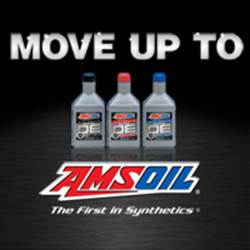6 REASONS TO CHANGE YOUR MOTOR OIL
AMSOIL synthetic motor oil helps you feel confident your engine is protected and can deliver extended drain intervals. But every motor oil eventually loses its potency and must be replaced to ensure peak engine performance.
Let’s take a look at what happens to motor oil over time and why you periodically need to change oil.
Click to download the AMSOIL catalog!
1. LOSING THE BASE

Base oils are the backbone of the finished lubricant that ends up in your engine. Over time, they lose effectiveness due to oxidation, high heat, moisture, viscosity loss and fuel dilution.
Click here
for more information on converting to synthetic oil.
2. OXIDATION

The interaction between oxygen molecules and motor oil molecules naturally leads to chemical breakdown. Just as oxygen causes a cut apple to brown or exposed metal to rust, it breaks down base oils and reduces motor oil’s effectiveness. Oxidation can lead to increased oil viscosity, which negatively affects energy efficiency. It also causes the formation of harmful deposits and sludge.
Click here
for more information on converting to synthetic oil.
3. HIGH HEAT

Todays’ engines run hotter than ever before, with temperatures up to 235F (113C), and even higher if towing or hauling.
Click here
for more information on converting to synthetic oil.
4. MOISTURE

Your vehicle is subjected to temperature swings, even when it is parked in the garage. Those temperature swings cause condensation to form inside your engine, leading to water contamination. Leaving a vehicle parked for extended periods or taking short trips that don’t allow the engine to fully warm up allow water to remain in the oil rather than evaporating and exiting through the tailpipe. Water can lead to formation of sludge – another reason why you must change oil.
Click here
for more information on converting to synthetic oil.
5. VISCOSITY LOSS

A lubricants viscosity is its most important property. Viscosity has a direct bearing on wear protection, and your engine is designed to operate best using a motor oil of a specific viscosity (e.g. 5W-30). The intense pressure the oil bears as it’s squeezed between moving parts, like the piston ring/cylinder wall interface, can tear apart, or shear, its molecular structure, leading to viscosity loss. Suddenly, the 5W-30 motor oil was designed to use is now essentially 5W-20 oil, and wear protection may be compromised. When this happens, it’s time to change your oil.
Click here
for more information on converting to synthetic oil.
6. FUEL DILUTION

Fuel can wash past the piston rings and contaminate the motor oil, causing it to lose viscosity. Frequent short that don’t allow the oil to reach normal operating temperature can be especially problematic because the fuel won’t volatilize and exit through the PCV system. Excessive fuel dilution leads to sludge and varnish, requiring you to change oil more frequently.
Shop for Signature Series Synthetic and other gasoline engine oil now in the on-line store!







